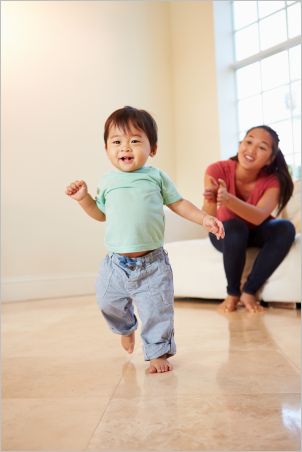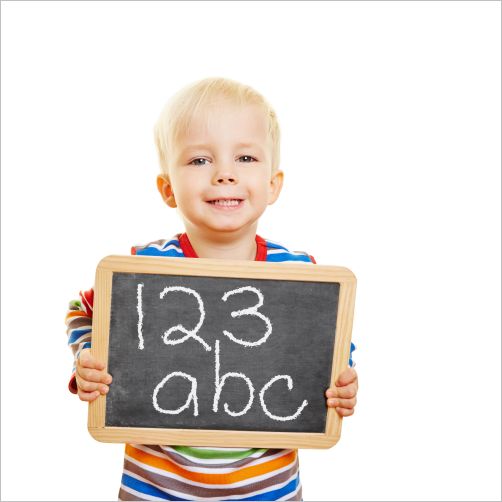Developmental Milestones
Developmental milestones are guidelines that can reassure you your toddler is on track developmentally. If your toddler is developmentally delayed and could benefit from early intervention, they’ll also give you that information early. But these milestones are only rough guidelines. Every child is different, and many children will be slightly advanced or behind in some area or another.
Just because your child is slow at developing fine motor skills, for instance, doesn’t mean he’ll have trouble with fine motor skills later in life. The rate at which a skill develops in baby and toddlerhood is not related to the adeptness your child will have at that skill later in life.
Below are some basic toddler developmental milestones you can read through to determine how your child is doing, and find out if there are any areas that could use a little work.

Developmental Milestones for 12 Months
By the time you celebrate your child’s first birthday, he will probably:
• Be able to crawl
• Be able to use furniture, toys or people’s legs to pull himself up to stand
• Cruise along furniture
• Say a few words or exclamations, maybe including dada and mama
• Understand the word and concept of no, though he may not always obey
• Use gestures: wave goodbye, shake head no
• Enjoy banging toys on tables or highchairs; enjoy throwing things
• Be able to drink from a cup, and perhaps even use a spoon
• Find an familiar object you ask for
• Sit when asked to
Developmental Milestones for 24 Months
By the time your child turns two, he will probably:
• Be able to say around ten to twenty words, possibly including names of family members
• Put together two or three words to make phrases
• Be able to play pat-a-cake
• Use language to express his own wants, perhaps saying ‘water’ when he wants water.
• Identify and point to eyes, nose, mouth and toes when asked
• Bring toys to you when you ask for them, even from another room
• Walk independently
• Carry toys around, or pull them behind him
• Run a little
• Be able to kick a ball
• Be able to climb on and off his bed, the couch, and other household furniture
• Be able to go up and down the stairs, with support
• Be able to ‘draw’ with markers, a pen, or a crayon
• Understand simple language, and know the names of family members
• Play imaginative, make-believe games, such as imitations of mommy and daddy
• Be able to sort simple objects into basic sets, such as by color or by shape
Developmental Breakthrough for 36 months

By the time your child turns three, he will probably:
• Be able to communicate effectively with speech, and talk to you and others
• Be able to identify his own body parts
• Know and say his own first name; be able to answer “How old are you?” with his fingers
• Put nouns and verbs together to make short sentences
• Answers questions
• Ask questions, including “why?”
• Be able to climb
• Be able to walk backwards as well as forwards easily
• Understand the concept of time (for instance, yesterday, tomorrow, morning, or night)
If your child is behind these milestones in any areas, you may want to discuss it with your pediatrician, but any worry is probably premature at this time. Your pediatrician will ask you questions about your child’s ability in similar skills, observe him in the office, and then will be able to tell you whether or not your child needs any early intervention.
You should also be aware that some of these developmental milestones depend on the home environment and what your child has been taught. For instance, if you never showed your baby where her eyes, ears, nose and mouth were, she will not be very likely to be able to identify them at age two. If you never give your child paper and crayons she will not be able to draw. These are activities that encourage your child’s cognitive development, however, so if you find you have ‘gaps’ in the skills listed here, you may want to make a special effort to work on those areas with your child.
Click here to return from Developmental Milestones to Toddler Development
Click here to return from Developmental Milestones to Home Page
New! Comments
Have your say about what you just read! Leave me a comment in the box below.